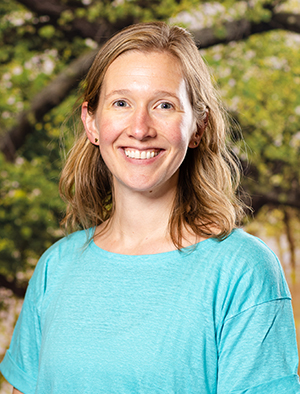
Emily Oldfield
Agricultural Soil Carbon Scientist
Work
Areas of expertise:
Soil organic matter, carbon sequestration, natural climate solutions
Description
Emily is focused on developing and testing criteria for a field-level, soil carbon quantification protocol. She is also identifying the necessary elements of a monitoring, reporting and verification process that could be implemented at a regional scale.
Her work aims to catalyze research on a realistic estimate of the carbon storage potential in U.S. agricultural soils that can help guide funding and policy for this and other natural climate solutions.
Background
Emily has extensive experience working on agricultural soil carbon science. She recently completed her graduate work and a post-doc at the Yale School of the Environment. At Yale, she also worked as a lab manager for the Bradford Lab, which focuses on ecosystem ecology, and as a project manager and research lead for Yale’s New York City Afforestation Project.
Education
- PhD, Yale University, School of the Environment
- MESc, Yale University, School of the Environment
- B.A. History, Yale College
Publications
Oldfield E.E., Wood S.A., Bradford M.A. (2020) Direct evidence for threshold effects of soil organic matter on crop growth. Ecological Applications, doi.org/10.1002/eap.2073.
Oldfield, E.E., Bradford, M.A., Wood, S.A. (2019) Global meta-analysis of the relationship between soil organic matter and crop yields. SOIL, 5, 15-32.
Oldfield, E.E., Crowther, T.W., Bradford, M.A. (2018) Substrate identity and amount overwhelm temperature effects on soil carbon formation, Soil Biology & Biochemistry, 124, 218-226.
Oldfield, E.E., Wood, S.A., Bradford, M.A. (2018) Direct effects of soil organic matter on productivity mirror those observed with organic amendments. Plant Soil, 348, 1–11.
Oldfield, E.E., Wood, S.A., Palm, C.A., Bradford, M.A. (2015) How much SOM is needed for sustainable agriculture? Frontiers in Ecology & Environment, 13, 527.
Oldfield, E.E., Felson, A.J., Auyeung, D.S.N., Crowther, T.W., Sonti, N.F., Harada, Y., Maynard, D.S., Sokol, N.W., Ashton, M.S., Warren, R.J., Hallett, R.A., Bradford, M.A., (2015) Growing the urban forest: tree performance in response to biotic and abiotic land management. Restoration Ecology, 23, 707-718.
Latest pieces
-
Comparison of biochar carbon market protocols
EDF Library, August 20, 2025 -
Measuring soil carbon is economically feasible
Growing Returns Blog, January 21, 2025 -
Measure-and-remeasure as an economically feasible approach to crediting soil organic carbon at scale
Environmental Research Letters, January 17, 2025 -
The importance of accounting method and sampling depth to estimate changes in soil carbon stocks
Carbon Balance and Management, January 26, 2024 -
Climate mitigation through soil amendments: quantification, evidence, and uncertainty
Carbon Management, July 3, 2023 -
New report provides a science roadmap for natural climate solutions
Climate 411 Blog, November 13, 2022 -
New report provides a science roadmap for natural climate solutions
Growing Returns Blog, October 31, 2022 -
The science needed for robust, scalable, and credible nature-based climate solutions for the United States
October 31, 2022










